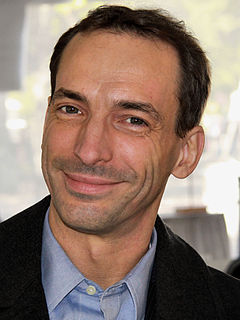A Quote by Daniel Goleman
Research shows that for jobs of all kinds, emotional intelligence is twice as important an ingredient of outstanding performance as cognitive ability and technical skill combined.
Related Quotes
Cognitive skills such as big-picture thinking and long-term vision were particularly important. But when I calculated the ratio of technical skills, IQ, and emotional intelligence as ingredients of excellent performance, emotional intelligence proved to be twice as important as the others for jobs at all levels.
Comparing the three domains, I found that for jobs of all kinds, emotional competencies were twice as prevalent among distinguishing competencies as were technical skills and purely cognitive abilities combined. In general the higher a position in an organization, the more EI mattered: for individuals in leadership positions, 85 percent of their competencies were in the EI domain.
Our relationship with sleep is currently in crisis, but we're also living in a golden age of sleep science - revealing all the ways in which sleep and dreams play a vital role in our decision-making, emotional intelligence, cognitive function, and creativity. Every week, new research reveals how vital sleep is to our health, happiness, job performance, and relationships.
Human beings have a variety of intelligences, such as cognitive intelligence, emotional intelligence, musical intelligence, kinesthetic intelligence, and so on. Most people excel in one or two of those, but do poorly in the others. This is not necessarily or even usually a bad thing; part of Integral wisdom is finding where one excels and thus where one can best offer the world one's deepest gifts.
I think in the coming decade we will see well-conducted research demonstrating that emotional skills and competencies predict positive outcomes at home with one's family, in school, and at work. The real challenge is to show that emotional intelligence matters over-and-above psychological constructs that have been measured for decades like personality and IQ. I believe that emotional intelligence holds this promise.
Conventional measures of mental ability, such as intelligence tests and scholarship, show some of the very highest records belong to INFP and INFJ types, who relegate thinking to last place or next to last. The preference for thinking appears to have far less intellectual effect than the preference for intuition, even in some technical fields, such as scientific research, where its influence was expected to be most important.
Develop all four intelligences. PQ (physical intelligence) which represents 70 trillion cells that fight disease and digest your breakfast. IQ (intellectual intelligence) EQ (emotional intelligence) the sensing and wisdom of the heart - - and SQ (spiritual intelligence) having to do with meaning, purpose and integrity around your selected value system and your believed source. When combined, they change the world for good.
The part of the brain most affected by early stress is the prefrontal cortex, which is critical in self-regulatory activities of all kinds, both emotional and cognitive. As a result, children who grow up in stressful environments generally find it harder to concentrate, harder to sit still, harder to rebound from disappointments, and harder to follow directions. And that has a direct effect on their performance in school.
Emotional intelligence in the work that we do, in the Resolving Conflict Creatively Program, is about equipping young people with the kinds of skills they need to both identify and manage their emotions, to communicate those emotions effectively, and to resolve conflict nonviolently. So it's a whole set of skills and competencies that, for us, fall under the umbrella of emotional intelligence.
































